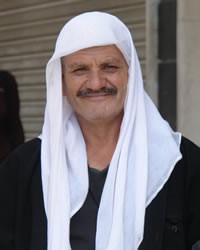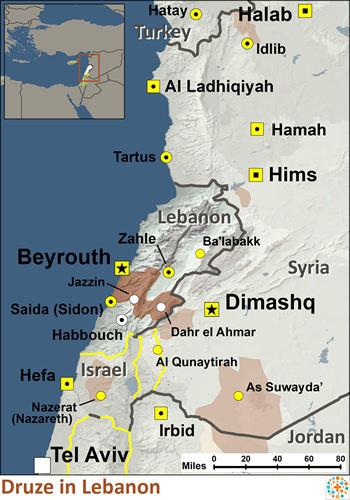Druze is a religious group in Lebanon, Israel, Jordon, and Syria.
They are loyal to the country in which they reside. They are known as fierce soldiers who fear no death. The Druze in Lebanon speak Northern Levantine Arabic as their first language. The Druze in Lebanon have made significant contributions to their country. Some have been in the military. Others have been in politics, law, education, or the entertainment industry. They have a close relationship with Christian communities.
The religion of the Druze began in the 9th century AD, as a sect of Islam. Darazi, a preacher, and Hamza ibn Ali ibn Ahmad, a Persian mystic, were instrumental in popularizing the religion. They announced that God had manifested himself in human form as al-Hakim Bi-amr Allah (985 or 996-1021 AD), a Muslim caliph from Cairo, Egypt. They now believe that Darazi began to distort the message; his writings are now considered blasphemous.
Druze hold the Koran to be sacred, but look upon it as an outer shell, holding an "inner, esoteric meaning". Their religious texts are known collectively as "Kitab Al Hikma", the book of wisdom. This is a collection of books, of which the first six are most used. They are firmly monotheistic, believing in a single God. They recognize seven major prophets, including Adam, Abraham, and Jesus (who they believe only to be the son of Joseph). Each major prophet had seven minor prophets; each of the latter had twelve disciples.
Druze believe in the transmigration of the soul. That is, at death, one's soul is instantaneously reincarnated (in time and space), and it is reborn into another life. Their concept of heaven and hell is spiritual. It is believed that heaven represents the ultimate happiness that the soul experiences when it unites with and meets its creator. Hell is the bitter feeling of being deprived endlessly of the glorious presence of the Almighty.
Spiritually, the Druze need to meet their Maker in a personal way, opposed to an esoteric mental exercise offered in their religion. If a Druze man or woman becomes a follower of Jesus Christ, he or she will be excluded from the Druze community. The nation of Lebanon often experiences chaos, violence, and insecurity. This makes it difficult for ideas to spread.
Pray that the Lord would lead Druze to listen to Christian radio programs.
Pray that many Druze living outside of their homeland would become followers of Jesus Christ.
Pray that believing Druze would go to Lebanon and tell their family and friends about the Savior.
Pray for radio and TV programs in Levantine Arabic to deliver the good news to the Druze.
Scripture Prayers for the Druze in Lebanon.
Anonymous.
https://en.wikipedia.org/wiki/Lebanese_Druze
| Profile Source: Joshua Project |


























